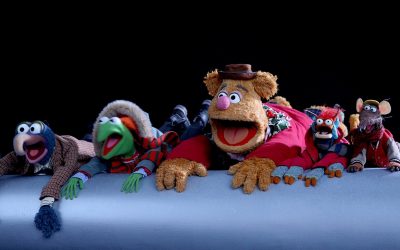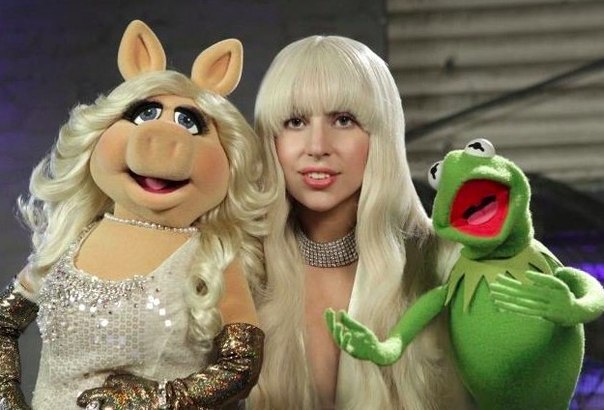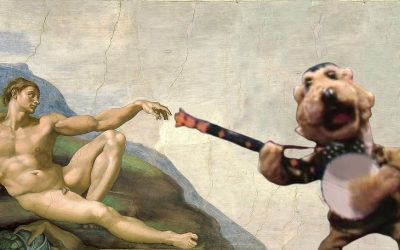Part 1 – Part 2
 Last Friday night, an event took place which I’m pretty sure was the coolest thing that’s ever happened in New Jersey.
Last Friday night, an event took place which I’m pretty sure was the coolest thing that’s ever happened in New Jersey.
They called it “Sesame Street at 40: A Night of Celebration and Discovery with the Legendary Cast,” and it all went down at William Paterson University. A ton of grown-up Sesame fans were there, including a large handful of Tough Pigs forum members. This was lovely, because as terrific as the panel discussion was, it was a special bonus feature to get to spend time with so many fine Muppet fans, some of whom I’ve known in “real life” for a while now, some of whom I was meeting for the first time.
I’m going to tell you all about it now, and hopefully I’ll get this posted before someone inevitably posts a video of the entire thing somewhere, thus rendering this written account completely moot. I hate being moot. I will, however, sprinkle in a few stealthily recorded video clips posted by a member of the audience.
The first person onstage was Tommy Shi. Tommy Shi! I couldn’t believe it was really him! After all my years of watching Sesame Street, I never thought I’d get to see Tommy– wait, who? I don’t know. Some kind of guy from Mercedes Benz, apparently. I’m not really sure why he was there, but it’s a good thing he was, because he introduced Street Gang author Michael Davis, who in turn introduced the eight people we paid 45 bucks to see: writer Tony Geiss, Bob McGrath, Fran Brill, Marty Robinson, Kevin Clash, Sonia Manzano, Caroll Spinney, and Frank Oz.
I don’t think I’m alone in saying that, while I was excited about seeing all these guys and hearing their stories, it felt extra-special to have Frank Oz on the panel. He tends to be a pretty reserved with his Muppety memories — as is his right, of course — so I was particularly psyched to see his bald head. He was also rocking a fairly magnificent scarf. David Rudman was originally advertised as being on the panel too, but for some reason he didn’t appear and wasn’t even listed in the program.
Michael Davis kicked things off by asking everyone about their early days on the show. He asked Frank about the genesis of Bert and Ernie (prefacing the question by asking whether it’s more correct to say “Bert and Ernie” or “Ernie and Bert” — the consensus was “Bert and Ernie”; personally I’ve always used them interchangeably), and Frank talked about how, during the workshopping process, they initially tried Jim as Bert and Frank as Ernie until they realized it was more natural the other way around.
Next, Caroll Spinney talked about evolving Big Bird from the dumb, goofy fellow from the first season to the lovable, giant kid he is today. He said when he sees the first episode now he finds it “embarrassing.”
Sonia Manzano said Maria was created as a response to complaints from the Hispanic community that there were strong African-American characters on the show, but no Hispanics. She talked one the earliest scenes she did — It was with Grover, and she was watching Frank instead of the puppet, until finally Grover said, “Stop staring at that man!” She also mentioned an early scene with Big Bird — She was feeling nervous, and Big Bird said: [and here Caroll jumped in and did the voice to finish her sentence] “Don’t worry, Maria, just remember that behind that camera there are millions of people watching you.”
Manzano recalled that Maria initially ran a library on the street, and over the years the character went from being a teenager to a bit of a hippie to a feminist, and eventually became a wife and mother. It’s a pretty impressive fictional biography… Not many other TV characters have gone through so many phases of life in “real time” like that.
Kevin Clash talked about watching Sesame Street as a kid for two reasons: Because he liked the show, and so he could study the puppets to try to figure out how they were built. (When I was a kid, I watched the show for half of the same reasons.) Kevin’s favorite character is Grover, and when he said this, Michael Davis launched into his “Grover as middle child” theory. If you’ve seen any of the publicity Davis has done for his book, you’ve heard the theory, in which he claims that Grover is a middle child because he tries so hard at everything he does in a desperate attempt to be noticed. It’s an interesting thought, but it doesn’t explain why Grover was my favorite back when I was first an only child, then an oldest child. In those days, Grover, as far as I was concerned, lived under my bed. What does that say about me?
Marty Robinson said he’s been on Sesame Street since he was 28. Instead of starting out performing right hands for years and years, as is the tradition for newcomers, he was given Snuffy quickly. He now believes his first eight years as Snuffy were pretty terrible, which, if my math is correct, means he started getting good around 1988. He said there was a hazing process on the show, and that puppet builder Kermit Love in particular loved torturing newbies. He didn’t elaborate on that thought, which is unfortunate, or possibly fortunate.
Fran Brill explained how she became an Muppeteer: She was doing work as a voice actor when she saw an ad stating that Jim Henson was training new puppeteers for a Christmas special (The Great Santa Claus Switch), so she called the company and talked to Jim on the phone himself. (Can you imagine? As Davis suggested, that’s like calling Disney and talking to Walt. Heck, it’s like calling Kellogg’s and talking to Tony the Tiger.) She said she’d like to record voices for the special, but he told her they didn’t really do it that way — puppeteers do their own voices. She went to the puppet training workshop, got cast in the special, and ended up on Sesame Street. It was striking for her to work with Will Lee (Mr. Hooper) on the show, because he had been her acting teacher. I never knew that, and it’s a great story, but having read Street Gang, it’s amazing at how many little coincidences like that there were among the cast and crew of the show in the early days.
Bob McGrath talked about how being on Sing Along With Mitch led him to superstardom in Japan (Thousands of teenage girls screaming, “Bobu! Bobu!”), and how he decided he’d rather pursue a singing career in the States, which eventually led to his being cast on Sesame Street. He also had some funny stories about working with Ralph Nader doing “The People in Your Neighborhood” for The Sesame Street Special. Nader had trouble memorizing his lines, Nader insisted on singing “the people whom you meet” instead of “the people that you meet,” etc. It’s a good thing Nader didn’t audition for the role of Bob.
Next, Michael Davis asked Tony Geiss about writing for kids, and Geiss replied that it’s “impossible,” so instead they write for people. He went on to describe how the writers are given a list of curriculum needs every season and they choose items they want to write about. For the environmentally themed season 40, he picked the word “hibernation” from the list and wrote a script about Baby Bear’s family attempting to hibernate.
So all that stuff was fascinating and informative, but the audience really perked up when Caroll unzipped his duffel bag and pulled out Oscar. Oscar brought the house down every time he was on, leering at Sonia Manzano and doing his usual “I hate being happy because it makes me miserable, but being miserable makes me happy, but being happy makes me miserable” shtick, which is somehow still entertaining even after the millionth time. There was some discussion about how Maria and Oscar have a unique dynamic on the show, and Caroll took advantage of the opportunity of a grown-up audience to make it clear exactly what’s at the root of that dynamic: “Maria, I just have one question,” Oscar said. “So why’d you marry Luis?!”
The whole event was dedicated to the memory of Richard Hunt, and it was around this time that the discussion turned to Richard and his amazing talent. Manzano pointed to Gladys the Cow’s song “Proud to Be a Cow” as one of his best performances, and Tony Geiss said the character of Sully proves that Richard was a great actor. They ran a video of the Forgetful Jones “Oklahoma” sketch and the Don Music “Mary Had a Bicycle” sketch. The audience absolutely loved them, and it was fantastic to watch them with an auditorium full of people cracking up. In fact, I would pay to attend an event consisting of nothing but screenings of Richard Hunt sketches. I can imagine that the “Cookie Monster tried to get cookies from a library” sketch with Richard as the librarian would get a huge response. If you’re reading this website, you probably agree that Sesame Street is one of the greatest comedy shows in the history of television, and Richard was one of its funniest performers.
Geez, I still have pages and pages of notes left on this thing. This seems like as good a time as any to take a break. Come back tomorrow (or simply click right here) for Telly in a plastic bag, Michael Davis as James Lipton, questions from the audience, and the astonishing debut of Tiny Zoe.
Click here to comment on Richard Hunt’s greatness, or anything else in this article, on the Tough Pigs forum!



